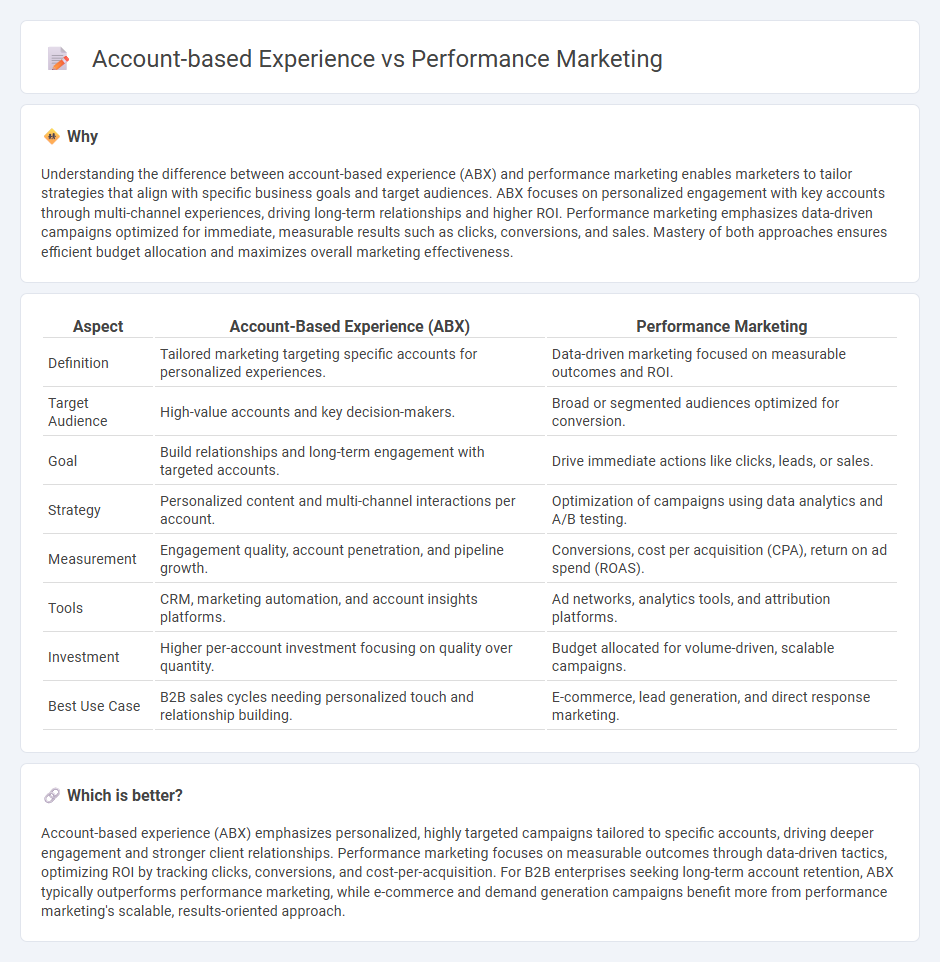
Account-based experience focuses on personalized marketing strategies tailored to specific high-value accounts, leveraging detailed data to enhance customer engagement and drive long-term relationships. Performance marketing emphasizes measurable results, using targeted campaigns and real-time analytics to optimize return on investment across various advertising channels. Explore how integrating these approaches can maximize both precision targeting and performance outcomes.
Why it is important
Understanding the difference between account-based experience (ABX) and performance marketing enables marketers to tailor strategies that align with specific business goals and target audiences. ABX focuses on personalized engagement with key accounts through multi-channel experiences, driving long-term relationships and higher ROI. Performance marketing emphasizes data-driven campaigns optimized for immediate, measurable results such as clicks, conversions, and sales. Mastery of both approaches ensures efficient budget allocation and maximizes overall marketing effectiveness.
Comparison Table
| Aspect | Account-Based Experience (ABX) | Performance Marketing |
|---|---|---|
| Definition | Tailored marketing targeting specific accounts for personalized experiences. | Data-driven marketing focused on measurable outcomes and ROI. |
| Target Audience | High-value accounts and key decision-makers. | Broad or segmented audiences optimized for conversion. |
| Goal | Build relationships and long-term engagement with targeted accounts. | Drive immediate actions like clicks, leads, or sales. |
| Strategy | Personalized content and multi-channel interactions per account. | Optimization of campaigns using data analytics and A/B testing. |
| Measurement | Engagement quality, account penetration, and pipeline growth. | Conversions, cost per acquisition (CPA), return on ad spend (ROAS). |
| Tools | CRM, marketing automation, and account insights platforms. | Ad networks, analytics tools, and attribution platforms. |
| Investment | Higher per-account investment focusing on quality over quantity. | Budget allocated for volume-driven, scalable campaigns. |
| Best Use Case | B2B sales cycles needing personalized touch and relationship building. | E-commerce, lead generation, and direct response marketing. |
Which is better?
Account-based experience (ABX) emphasizes personalized, highly targeted campaigns tailored to specific accounts, driving deeper engagement and stronger client relationships. Performance marketing focuses on measurable outcomes through data-driven tactics, optimizing ROI by tracking clicks, conversions, and cost-per-acquisition. For B2B enterprises seeking long-term account retention, ABX typically outperforms performance marketing, while e-commerce and demand generation campaigns benefit more from performance marketing's scalable, results-oriented approach.
Connection
Account-based experience (ABX) and performance marketing are connected through their shared focus on targeting high-value accounts with personalized strategies to maximize ROI. ABX leverages detailed account insights to tailor messaging and customer interactions, while performance marketing uses data-driven tactics and measurable KPIs to optimize campaign outcomes. Integrating ABX with performance marketing enables businesses to deliver relevant experiences that drive conversion efficiency and revenue growth.
Key Terms
**Performance Marketing:**
Performance marketing leverages data-driven strategies such as pay-per-click (PPC), affiliate marketing, and social media advertising to deliver measurable results and maximize ROI. Key performance indicators (KPIs) like cost per acquisition (CPA), return on ad spend (ROAS), and conversion rates are critical for optimizing campaigns in real-time. Explore how performance marketing can accelerate growth and drive targeted customer engagement in your business.
Conversion Tracking
Performance marketing leverages data-driven strategies to optimize conversion tracking, emphasizing precise measurement of user actions and ROI from diverse digital channels such as PPC, social media, and email campaigns. Account-based experience centers on personalized engagement with high-value accounts, integrating conversion tracking at the account level to tailor marketing efforts based on detailed customer interactions and lifecycle stages. Explore further to understand how each approach can maximize your conversion tracking effectiveness and drive targeted growth.
ROI (Return on Investment)
Performance marketing emphasizes measurable ROI through targeted campaigns, leveraging data analytics to optimize conversions and minimize customer acquisition costs. Account-based experience (ABX) customizes marketing and sales efforts for specific high-value accounts, enhancing engagement and driving higher lifetime value by addressing individual client needs. Explore deeper insights into how aligning these strategies can maximize your marketing ROI.
Source and External Links
What Is Performance Marketing? Definition and Beginner's Guide - This guide explains performance marketing as a strategy focused on measurable outcomes like clicks or conversions, where advertisers pay only when specific actions occur.
Performance-based Advertising - Performance marketing, also known as pay-for-performance advertising, involves paying only when measurable results are achieved, such as acquisitions or sales.
What is Performance Marketing? - This comprehensive guide covers performance marketing as a strategy where advertisers pay only for specific actions, targeting users at the bottom of the marketing funnel.
 dowidth.com
dowidth.com